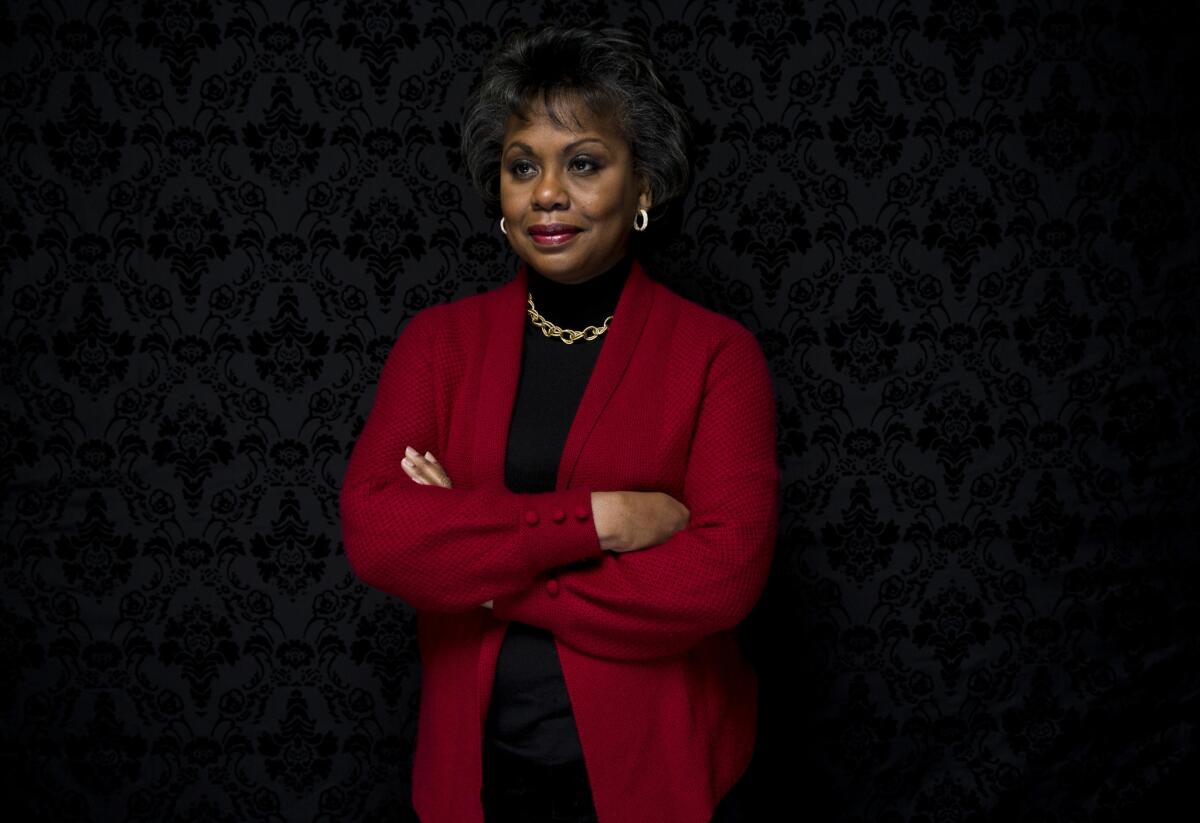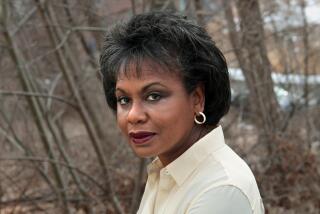Anita Hill reflects on telling her story in the documentary ‘Anita’

WASHINGTON — The first time I talked to Anita Hill, she was teaching commercial law in Oklahoma, living in obscurity in the state where she grew up on an isolated farm with 12 siblings.
For roughly a week in 1991, I pressed her to tell me what she had told the Senate Judiciary Committee in confidence about Supreme Court nominee Clarence Thomas, to no avail. She was a very private person and, I can attest, a reluctant witness.
Then, when the story of her allegations of sexual harassment did break based on other sources, she was instantly a celebrity or a demon, her life upended. When she got back home after the hearings, Oklahoma had become hostile territory, where public officials continued to vilify her, threats to her life arrived in the mail and angry strangers accosted her in the street.
PHOTOS: Behind the scenes of movies and TV
Now, in “Anita,” a highly regarded documentary released here this week — it opened in Los Angeles last month — Hill is taking the stage on her own terms. No longer reluctant to speak, she is in fact eager to present herself, her family and her side of the story, 22 years after the most sensational Supreme Court hearings in history.
In an interview before the opening of the film in Washington, Hill was blunt about how she was treated but more interested in talking about the future. She wanted to set the record straight about her life after she left Washington and Oklahoma behind.
“So many people think, oh, she was completely devastated,” Hill told me. “I didn’t want that to be the dynamic that people would have of me and my life. And good things happened because of the hearings,” she noted.
“Anita,” directed by Freida Mock, who won an Academy Award for her 1994 documentary on sculptor Maya Lin, shows Hill in her new home on friendly ground in Waltham, Mass., outside of Boston. She was interviewed by Mock on camera in her small office at the law school at Brandeis University, where she teaches.
“Frankly, I felt that her story had not been told,” Mock said in an interview. “Given the sensationalism of the hearings, I think the public went away not sure what her story was.”
“Anita” opened to positive reviews and healthy box office in its limited opening. It’s expanding to other cities this weekend, according to the film’s distributor, Samuel Goldwyn Films.
RELATED: 10 best docs of 2013, and a new crop in 2014
Three years in the making, the film goes back in painful detail to the hearings, where Hill was, as she said in an interview, “demonized” by Republicans who called sexual harassment “crap,” and largely abandoned by Democrats too afraid or too ineffective to mount a defense. The documentary does not question her version of the hearings. Times critic Kenneth Turan noted in his review, “What ‘Anita’ does not offer is a platform for those who still believe that this woman made it all up.”
The film for the first time creates a vivid portrait of her family, including her elderly, stiff-backed, religious parents. It reveals a close relationship with Boston businessman Chuck Malone, whose ring she wears even as she maintains her independence.
It also shows her basking in support from women of all ages across the country, and, in the end, clearly enjoying the life that was created for her after my story in Newsday and another on National Public Radio made her allegations public.
Hill said she had been approached by several directors who wanted to tell her story before she found the right person in Mock. She overcame her reluctance to be in the limelight because “we have a generation of young people who didn’t really understand the history of these issues that they are confronting every day.”
Hill said she was very happy with the film, over which she said she had no editorial control. “It clearly tells a very beautiful story about my family,” she said.
PHOTOS: Celebrities by The Times
Hill was blunt about why she believes Thomas, whom she accused of harassing her while he was chairman of the Equal Employment Opportunity Commission, should not have been confirmed. (Thomas has refused requests to discuss the film.) She felt her experience “tells you what kind of judge he’s going to be on these kinds of cases. You’re appointing him to a lifetime position, and you should know about his disregard for the law itself.”
Hill now has a ready answer for a question Republicans pummeled her with during the hearings: Why didn’t she speak up earlier? “The short answer is because the Supreme Court wasn’t at stake before and a lifetime appointment wasn’t at stake before, and in 1991 it was.”
Much of the end of the film is about the work that Hill is doing now, in appearances around the country, to raise awareness of harassment and other gender issues with a younger generation, sometimes with young people who have never heard her name.
The issues now, Hill said in the interview, include harassment and assault in the military and on college campuses, as well as cyberbullying and online harassment.
“So we’re at a really critical time,” she said. “I think we started a process in 1991, and I think 22 1/2 years later we have enough perspective and enough wisdom … to make sure we hold ourselves accountable to a new generation.”
More to Read
Only good movies
Get the Indie Focus newsletter, Mark Olsen's weekly guide to the world of cinema.
You may occasionally receive promotional content from the Los Angeles Times.











